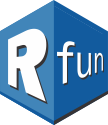Outline for R/data-science workshop
Why R / Tidyverse / Quarto
We’re going to learn about one of the best tool-based ecosystems for orchestrating and sharing our reproducible computational thinking. A major tennant of reproducibility is to do everything with code. This include generating our reports from code (Quarto) as well as importing data, wrangling, modeling, and visualizing data (Tidyverse.)
R and the Tidyverse are a powerful language for data analysis1. In addition to a wide range of built in functions there are thousands of library packages2 we can use in custom programming to extend R into specialized areas of computation.
Based on a weekly schedule, we will learn tidyverse tools and techniques to transform our data into the tidy data format, a consistent format for data organization, manipulation, and analysis.
This workshop series is sponsored by The Center for Data and Visualization Sciences, part of the Duke University Libraries. Videos and links to code, data, and slides for this and many other R workshops can be found at Rfun. These and all other CDVS all workshop resources are available at the CDVS online learning page.
Getting started
Reproducibility: data-first tools help leverage reproducible workflows throughout computational thinking
Do everything with code
Organize our work into RStudio Projects
blank-slate instead of .Rdata
Restart instead of
rm(list = ls())Version Control: git and GitHub
{
renv} for archiving/documenting package environments
Tool suite
RStudio
Quarto Notebooks (Merge literate coding with report rendering)
{
dplyr} & {tidyr} - a grammar for data wrangling{
ggplot2} - a grammar of graphicsOther packages including, for example: {
readr}, {forcats}, {stringr}, {purrr}, {tidymodels}
Console
basic computation
vectors and vectorized math
environment variables and data variables
assignment operators:
<-and=(not the same as equivalency==)pipes =
|>and%>%
RStudio Projects
- use projects instead of
setwd(); relative paths are vital to reproducibility - Documents: Quarto document
- use projects instead of
Import CSV data
read_csv()and the data import wizard found in Files tab and Environment tabOther data formats
- {
readxl}, {haven}
- {
SQL
Code-chunks can perform SQL
{
dbplyr}
Exercise
import a CSV file
import a Stata categorical file using {haven}
{
dplyr}select(), filter(), arrange(), mutate(), group_by(), summarize(), count()
Exercise
Semantic meaning in data
Codebooks in a literate coding context
Visualization plus EDA
{ggplot2} viz
- Exercise
basic interactivity - ggplotly()
- Exercise
{
broom} and handling modeling outputs (e.g. linear regression)Advertise {
tidymodels}Exercise
{skimr} and EDA
skim()
Reprise group_by() and summarize()
{
tidyr} pivot_longer() and pivot_wider()Tall data - what is it?
Tall data for iteration: computation
Tall data for visualization , facet_wrap()
Tall data for modeling ; {purrr} a first look.
join with
dplyr::left_join()or other {dplyr} join functionsWrap-up and Summarize the day
Iteration and custom functions
Questions from yesterday
R is a functional programming language
What is functional programing?
- Customizing functions and iterating without FOR loops
FOR loops?
Tidyverse preference for data frames
Vectorized math (review)
- Vectorized iteration ; environment variables and data variables
Case study - import multiple data files + data cleaning + analysis + visualization
- read_csv() again
Introduce {
stringr} and regular expressionsSome nifty data wrangling functions
Composing custom functions
Nesting data for iteration
Review, questions, case study, reports
Questions / Review
Setup case study
Using R to orchestrate data workflows
Reproducible report rendering (slides, PDF, dashboards, etc.)
Summarize
Finding help
Resources
Tidyverse primers
RStudio IDE > Help > [ Documentation | Forum | Cheatsheets | Shortcuts ] & on-board Help tab
Tidyverse webpages: {
package_name}.tidyverse.org (e.g. ggplot2.tidyverse.org)Interactivity
Recommendations
Footnotes
R is a data-first programming language↩︎
Extend R with domain-specific packages. See: MetaCran, CRAN, github, bioconductor↩︎
